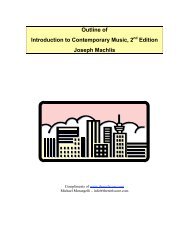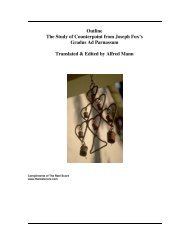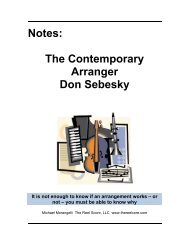An Outline of The History of Western Music Grout ... - The Reel Score
An Outline of The History of Western Music Grout ... - The Reel Score
An Outline of The History of Western Music Grout ... - The Reel Score
Create successful ePaper yourself
Turn your PDF publications into a flip-book with our unique Google optimized e-Paper software.
5. Summary<br />
a) Bach's works were quickly forgotten after his death because musical taste<br />
changed radically in the middle <strong>of</strong> the 18th century<br />
(1) Composing his most important works in the 1720's & 30's at the same time a<br />
new style emanating from the opera houses <strong>of</strong> Italy invaded Germany and the<br />
rest <strong>of</strong> Europe making Bach's music seem "old fashioned"<br />
(2) This eclipse in the mid 18th century was not total and citations from his works<br />
appeared frequently in the musical literature <strong>of</strong> the time - the important<br />
periodical "Allegeine musikalische Zeitung" opened its first issue with a Bach<br />
portrait<br />
(3) A fuller discovery <strong>of</strong> Bach finally began in the 19th century<br />
i) a biography by Johann Nikolaus Forkel in 1802<br />
ii) revival <strong>of</strong> St. Matthew Passion by Carl Friedrich Zelter (1758-1832) and its<br />
performance in Berlin under Felix Mendelssohn in 1829<br />
iii) the establishment <strong>of</strong> the Bach Society in 1850 led to the collection edition <strong>of</strong><br />
his works - completed in 1900<br />
b) Bach occupied a central position in music history - absorbing into his works all the<br />
genres, styles, and forms <strong>of</strong> his time<br />
E. George Frideric Handel (1685-1759)<br />
1. Background<br />
a) won international renown during his lifetime and continued to be revered for his<br />
oratorios and operas<br />
(1) composed his first opera "Almira" at 19 - it was performed at the Hamburg<br />
opera house in 1705<br />
(2) lived in Italy between 1706 and 1710 employed by the Marquis Francesco<br />
Ruspoli as a musician/composer in Rome and at his country estates<br />
(3) enjoyed a long and prosperous career in London from 1710 composing for<br />
the Royal Academy <strong>of</strong> <strong>Music</strong> (under the King's patronage)<br />
i) a rival organization the Opera <strong>of</strong> the Nobility became a chief rival -<br />
generating a financially ruinous competion and both were nearly bankrupt<br />
by 1737<br />
ii) he turned to oratoriaos when the public would not support the Italian opera<br />
(4) he became a naturalized British subject in 1726<br />
b) <strong>The</strong> oratorios presented every year during Lent were performed to the English<br />
publics enthusiastic response - laying the foundation for the immense popularity<br />
that made Handel's music the prevailing influence on English musical life for more<br />
than a century<br />
2. <strong>Music</strong><br />
a) Suite & Sonatas - the suites contain not only the usual dance movements but also<br />
examples <strong>of</strong> the most current keyboard genres <strong>of</strong> the time<br />
b) Concertos - his most significant instrumental works are for full orchestra - above all<br />
the Oboe Concertos and the 12 Grand Concertos<br />
c) Opera - devoted 35 years to composing and promoting operas - at the end <strong>of</strong> his<br />
career turning more and more to the fashionable light melodic manner <strong>of</strong> the<br />
"modern" Italian composers<br />
d) Oratorios





